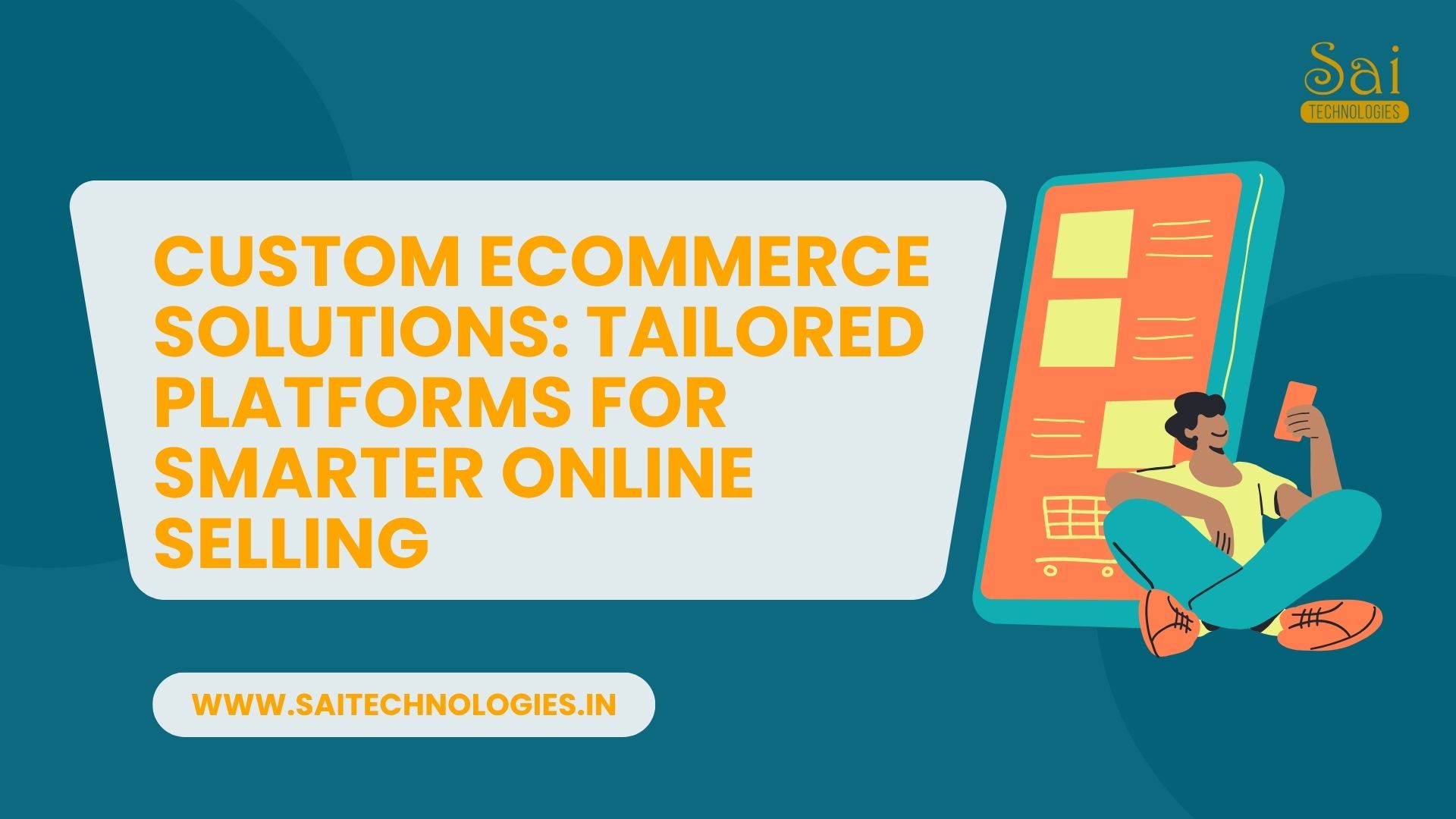Custom eCommerce Solutions-Tailored Platforms for Smarter Online Selling

The digital commerce landscape has seen explosive growth in recent years. With millions of online stores competing for customer attention, standing out in the crowd is no longer just about having a website—it’s about delivering a seamless, personalized, and efficient shopping experience. This is where custom eCommerce solutions come into play.
Unlike generic, template-based platforms, custom eCommerce development offers the flexibility and innovation businesses need to grow, scale, and stay ahead of changing market demands. Whether you're selling physical products, digital downloads, subscriptions, or services, a custom-built platform gives you full control over your operations, branding, and user experience.
Understanding Custom eCommerce Solutions
Custom eCommerce solutions refer to online store platforms designed and developed specifically for your business model, target audience, and long-term goals. These are not limited by themes or plugin restrictions. Instead, every element—from the user interface to the backend functionalities—is built to suit your exact needs.
These solutions are ideal for businesses that have outgrown basic platforms, require specialized features, or want to deliver a unique shopping experience that drives loyalty and conversions.
Why Businesses Choose Custom Over Templates
While off-the-shelf platforms like Shopify, WooCommerce offer convenience and speed, they often come with limitations:
Limited design customization
Plugin dependency and conflicts
Subscription-based pricing
Difficulties in scaling as the business grows
Lack of deep integration with existing systems
In contrast, custom eCommerce platforms allow for:
Full ownership of the codebase
Enhanced speed, security, and performance
Seamless integration with business tools (CRM, ERP, Inventory, etc.)
Custom workflows, checkout processes, and dashboards
A unique brand experience, free of cookie-cutter designs
Key Features of Custom eCommerce Platforms
When you opt for a custom solution, your eCommerce platform can include advanced, tailor-made features such as:
1. Custom User Interface
Your store's look and feel is built from scratch to reflect your brand identity. This includes custom layouts, animations, product pages, and banners.
2. Personalized User Experience
Use customer data to create a shopping journey tailored to individual users—personalized recommendations, dynamic content, and behavior-based promotions.
3. Advanced Product Management
Support for complex product variants, bundle offers, subscriptions, and dynamic pricing rules—everything your business model demands.
4. Flexible Payment & Shipping
Integration with multiple payment gateways, custom shipping logic, tax rules, and real-time order tracking.
5. Mobile-First Optimization
Your site will be fully responsive, fast, and user-friendly across all screen sizes, ensuring high mobile conversion rates.
6. Inventory and Order Automation
Real-time stock updates, automatic reordering, warehouse management, and smart order routing.
7. Robust Security Architecture
Custom SSL, encryption, two-factor authentication, and PCI-DSS compliance ensure safe transactions.
8. Scalable Architecture
Built to grow with your business—handle traffic spikes, launch new products, expand to new markets, and more without rebuilding your entire system.
Benefits of Custom eCommerce Development
Stand Out from the Competition
Your brand and store design won’t look like anyone else's. A unique visual identity and custom features help differentiate you in a saturated market.
Increased Conversions
A frictionless user journey, optimized checkout process, and personalized content all contribute to higher conversion rates.
Better SEO and Site Performance
Custom code and clean architecture allow for faster load times, improved crawlability, and higher search engine rankings.
Tailored to Business Workflows
Whether you operate in B2B, D2C, or hybrid models, your store can be built around your internal processes, not the other way around.
No Monthly Platform Fees
With custom development, you own your platform—no ongoing subscription fees, plugin costs, or platform commissions.
Common Industries Benefiting from Custom eCommerce Solutions
Fashion & Apparel – Offer virtual try-ons, size guides, style filters, and seasonal product collections.
Electronics & Gadgets – Product comparison tools, warranty management, and accessories bundling.
Furniture & Decor – AR product previews, space planning tools, and custom product configuration.
Health & Wellness – Subscription management, personalized product suggestions, and compliance tracking.
Food & Beverage – Custom ordering systems, delivery time slots, and real-time inventory tracking.
Custom eCommerce for B2B and Enterprise Businesses
Custom platforms are especially valuable for B2B businesses where customer-specific pricing, account-based login, credit terms, and bulk order workflows are essential.
Enterprise-level businesses also benefit from features like:
Multi-store or multi-brand architecture
Role-based user access
Integration with SAP, Salesforce, or Oracle
Audit logs and data governance
Localization support (multi-language/multi-currency)
Development Process for Custom eCommerce
Discovery & Planning
Define your business objectives, challenges, and customer needs. Create a roadmap and technical specification document.Design Phase
Develop UI/UX wireframes and visual designs that align with your brand and optimize the customer journey.Development & Integration
Build frontend and backend components, integrate APIs and external tools, and test each feature for performance.Quality Assurance
Run rigorous QA tests—functional, load, browser compatibility, and security testing—to ensure platform stability.Launch & Optimization
Deploy the site, monitor early usage, and optimize based on real-time data and feedback.Support & Maintenance
Ongoing updates, enhancements, bug fixes, and performance monitoring to keep your store in top shape.
Choosing the Right eCommerce Development Partner
A great eCommerce partner understands both the technical side and the business logic behind selling online. When choosing a development company, consider:
A strong portfolio of custom eCommerce projects
Experience with your industry
End-to-end service capabilities (design, development, SEO, hosting, support)
Transparent communication and agile development process
Long-term support and maintenance offerings
Conclusion
The world of eCommerce is becoming more personalized, more complex, and more competitive. Businesses can no longer afford to rely on generic platforms that limit growth, functionality, and brand identity. With custom eCommerce solutions, you get the tools and flexibility to build a platform that’s truly aligned with your vision and goals.
If you’re serious about growing your online business—whether it’s through better customer experience, deeper integrations, or global scalability—it’s time to consider going custom.

